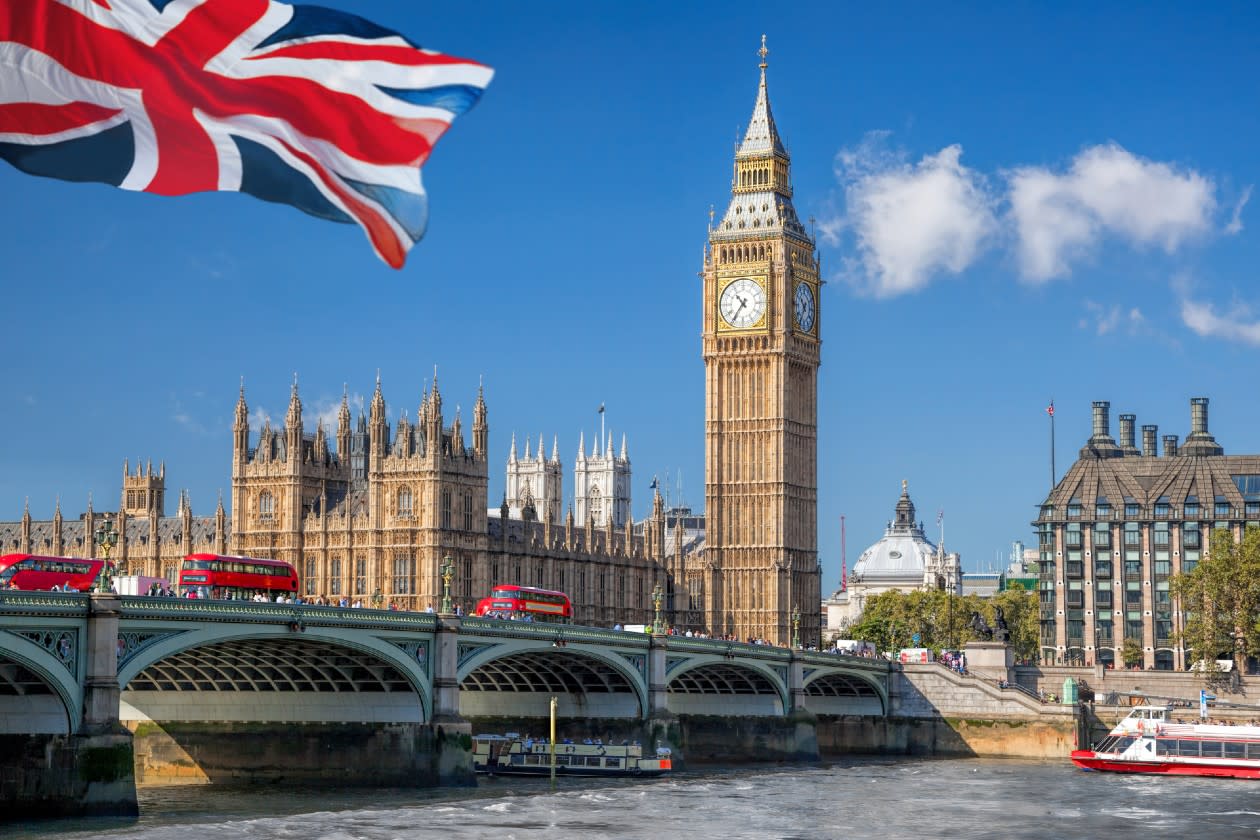The UK heads to the polls on 4 July.
Keir Starmer’s Labour is leading the latest opinion polls with around a 20-point lead on average over Rishi Sunak’s Conservatives.
We have to take voting intention polls with a pinch of salt and there’s still weeks to go, but if they’re anything to go by, Labour is on course to win a majority of seats.
The economic backdrop to the upcoming General Election looks less certain.
The good news is the UK has recovered from a shallow recession in the second half of 2023, and UK stock markets are moving higher as we progress through 2024.
But what could be next for UK stock markets and how have elections impacted financial markets in the past?
How have stock markets done in past general elections?
A useful way to view historical market performance around an election is to look at pre-election performance three to six months before the vote, and then look at the impact one week to one month after the vote.
Remember though, this is a very short period to look at performance – investing is for the long term and past performance is never a guide to what the future might hold.
Analysis from the Royal Bank of Canada looks at the performance of the FTSE 250 and the FTSE 100 before and after the last eight general election cycles.
The FTSE 250, the more domestically-focused UK index, has generated a positive performance in the six months before seven of the last eight UK general elections. The average return in the six months-prior to an election in the last four election cycles was 11%.
Interestingly, according to the analysis the weakest performance of the FTSE 250 was one month before an election. However, the index then tended to recover in the one-week and one-month periods following an election.
The performance of the FTSE 100 is more nuanced, as it’s considered a more international index, which might not be as affected by domestic politics.
Get our latest insights on what the General Election could mean for you and your money.
For example, the FTSE 100 doesn’t have the same level of positive performance six months before an election, rising only in five of the last eight election cycles. However, like the FTSE 250, the FTSE 100 also tended to rise after the election is out of the way.
Analysis by the University of Plymouth backs this up. It analysed the performance of the FTSE 100 in the three months before, during and after the last nine general elections.
It found the percentage of positive returns in the FTSE 100 three months before an election was 56%. During an election, the FTSE 100 had positive returns 67% of the time, and in the three months after an election the UK’s blue-chip index posted positive returns 56% of the time.
These results aren’t particularly revealing. While the media and the nation might become obsessed by politics during a general election cycle, the impact they have on financial markets, especially Britain’s blue-chip index, are difficult to ascertain, at best.
This article isn’t personal advice. Investments rise and fall in value, meaning you could get back less than you invest. Past performance isn’t a guide to the future. If you’re not sure if an investment’s right for you, ask for financial advice.
Which sectors have done best and worst in past elections?
A more illuminating way to glean the effect of general elections on financial markets is to look at the performance of sectors within UK stock markets.
Analysts at Royal Bank of Canada found that in the last eight election cycles, the strongest average outperformers after elections at a sector level in the FTSE 350 have been industrials, utilities and real estate.
In contrast, the energy sector tends to underperform during elections. As ever though, past performance doesn’t mean we’ll see the same patterns play out in future.
The sectoral performance split during an election cycle can be explained by two primary factors:
First, the focus on housing policy by political parties. And second, the prospect of windfall taxes on energy companies. The signs currently point to a change in government at the upcoming election. So, it’s worth taking a closer look at the policies put forward by the Labour party ahead of this election.
On housing, Labour could support more housebuilding and planning reform. Labour have also said that they’d close current loopholes on the windfall taxes applied by the Conservatives to the UK’s energy companies.
What about the economy?
The outcome of this general election could also impact fiscal policy, the size of the state, the UK’s relationship with the EU, and workers’ rights.
Labour have been clear on fiscal policy – they want to reduce debt-to-GDP without raising income or corporation taxes. They also want to focus less on government spending, and more on supply side factors to try and boost the state sector in the UK.
The UK is constrained by its tight public finances, meaning the government will need help in transforming the economy.
Rachel Reeves, the current Shadow Chancellor, has spoken about ideas around crowding in private capital to support public policy aims in infrastructure and green technologies. She also wants to restore investment in the UK economy.
Regarding the UK’s relationship with the EU, while Labour has ruled out taking the UK back into the EU and rejoining the single market, they have pledged to ‘fix’ the current Brexit deal and ‘reconnect’ with Europe.
Brexit was a seismic event for the UK. If Labour does win the next election, it will be worth watching closely whether a ‘reconnection’ with Europe is enough to boost sentiment towards UK financial markets.
Ahead of an election date, the Conservatives appear to be focused on immigration policy, with little detail about future financial policy. The most recent budget in March 2024, saw tax cuts and promises to lower debt-to-GDP further down the line.
They have also stated their interest in reducing National Insurance contributions from individuals to zero. But this is a very long-term ambition rather than something they think can be delivered in the next five years.
So, with the UK in a tight fiscal position, there could be little change in the UK’s fiscal policy even if we do get a change in government, which might limit the market impact.
Labour has said it will reintroduce the lifetime allowance (LTA) if it gets into government, but we don’t currently know how it will go about doing this.
There was talk of a carve out for certain professions like NHS consultants, while others think the LTA could be reintroduced, but at a higher level.
Whatever happens to the LTA, we need a predictable system that gives people certainty when taking long-term decisions around retirement.
Another way to analyse the impact of general elections on financial markets is to see if there’s a market preference for one party.
The Association of Investment Companies looked at the performance of UK-focused investment trusts in each parliament since 1987.
The best performance was under John Major’s Conservative government between 1992-1997. This was closely followed by the Conservative/Liberal Democrat coalition of 2010 – 2015.
Under Tony Blair’s first term as prime minister between 1997-2001, returns weren’t too far off these highs either.
So, investment trusts appear to perform well under both Labour and Conservative governments.
Perhaps unsurprisingly, in the most recent premierships of Boris Johnson, Liz Truss and Rishi Sunak, returns were nowhere near these highs and only just positive.
What does all this mean for investors?
This data suggests there are multiple factors that affect stock market returns, with politics just one of those. It also suggests that UK stock markets can adjust to different governments, even if there’s uncertainty during the immediate run up before an election.
Since the FTSE 100 was formed in January 1984, it’s risen from 1,000 to above 8,000 today. Plenty of governments and politicians have come and gone during that time, and the UK stock market continues to thrive although it’s faced a couple of knocks along the way. When we look at the impact of upcoming elections, it’s always worth keeping that in mind.
Chart showing FTSE 100 since inception
Whether you’re looking to invest in funds, shares or ETFs, discover the UK investment ideas our experts believe have the most long-term potential.


